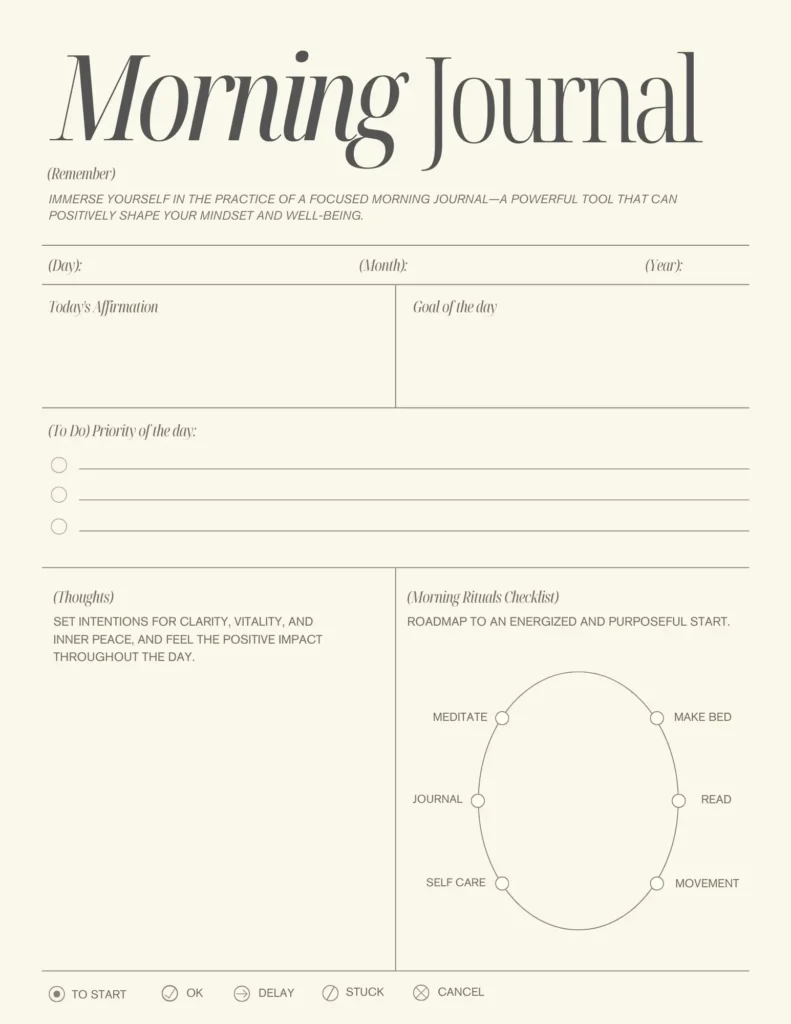The fast-paced world of today has made mental health an increasingly pressing issue. Finding practical strategies to maintain mental wellbeing is essential given the rising rates of stress, anxiety, and depression. Morning journaling is one easy-to-use but effective activity that can be helpful. We’ll discuss the advantages of morning journaling for mental health in this blog post, along with advice on how to fit morning journaling into your daily schedule.
Writing down your thoughts, feelings, and insights as soon as you get up is a practice known as morning journaling. It’s a peaceful time for reflection that enables you to establish a connection with yourself before the day gets hectic. You can analyze your feelings, make sense of your thoughts, and make plans for the next day when you write down your ideas.
Doing a morning journaling is a habit that can change your life. This easy-to-follow but effective habit can increase productivity, promote greater self-awareness, and improve mental clarity. This blog will help you understand the advantages of morning journaling, how to start, and how to make it a sustainable part of your daily routine, whether you’re new to morning journaling or looking to improve your technique.
The Benefits of Morning Journaling
1. Mental Clarity and Focus
Writing morning journaling, the first thing in the morning can help you decompress. It helps you to sort through your feelings and ideas, which is especially beneficial if you wake up with anxiety or overwhelm. You may arrange your ideas and create a positive mindset for the remainder of the day by writing them down.
2. Enhanced Productivity
Writing a morning journaling can increase your output. You can make a plan that helps you stay motivated and focused by writing down your priorities and goals for the day. This may result in improved time management and a stronger sense of achievement.
3. Emotional Well-being
Writing down your emotions can be a therapeutic process. You can safely explore your feelings in a morning notebook, which helps to lower tension and anxiety. This exercise has the potential to enhance emotional resilience and self-awareness over time.
4. Self-Revelation and Development
Maintaining a morning journaling facilitates self-connection. You can learn more about your behavior and habits by routinely reflecting on your ideas, past experiences, and aspirations. This self-awareness can support personal development and point you in the direction of a more contented existence.
5. Boost Your Creativity
Your mind is open to new thoughts and is fresh in the morning. Morning journaling can help you become more creative by inspiring you to come up with fresh ideas, investigate other viewpoints, and brainstorm solutions to issues.
How to Start Morning Journaling

1. Make the Correct Tool Selection
Choose a pen and journal that you like to use. Writing by hand can be a more fulfilling and intimate experience than typing due to its tactile nature. But if you’d rather journal digitally, there are lots of apps out there that might offer a comparable experience on morning journaling.
2. Schedule Time
Set aside time in your morning routine to write in your journal. It only needs to last ten to fifteen minutes to be effective. It is essential that you make it a regular part of your regimen.
3. Establish a Cozy Environment
Choose a comfortable, quiet spot where you won’t be disturbed. This could be a comfortable nook in your house, a cherished chair, or, in fine weather, a location outside. The act of morning journaling can be improved by a calm setting.
4. Begin with the prompts
Start with prompts if you’re not sure what to write about. Here are a few to get you going:
- For what do I feel thankful today?
- Which tasks are the most important to me today?
- What’s my mood this morning?
- What obstacles may I possibly encounter today, and how can I get past them?
- Which intentions or positive affirmations would I like to make a point of achieving today?
5. Write Freely
Let your mind wander freely and without criticism. Grammar, spelling, and punctuation are not important. Being able to freely and honestly express oneself is the aim of morning journaling.
Making Morning Journaling a Habit
.webp)
- Maintain Consistency
Any new habit must be formed consistently. Make an effort to morning journaling, each day at the same time. Connecting it to anything else you do in the morning, like having breakfast or coffee, could be helpful.
- Make a Note
To help you remember morning journaling, set up reminders. A sticky note on your mirror, an alarm on your phone, or a note in your calendar could be used for this.
- Exercise patience
A new habit takes time to form. If you skip a day or find it difficult at first, don’t give up. The more you practice, the easier it will get.
- Evaluate Your Development
Spend some time reviewing your entries from time to time. Examining your development might yield insightful information and reaffirm the advantages of morning journaling.
- Make It Fun
Make sure morning journaling is still pleasurable for you. If it begins to feel like a chore, try out a few different strategies until you figure out what suits you the best.
Real-Life Stories: The Impact of Morning Journaling
- Sarah’s Path to Self-Revelation
Professional in marketing, Sarah started morning journaling , to help her cope with stress. She eventually found that it assisted her in discovering her actual principles and hobbies. She pursued a career move that more closely matched her interests as a result of her newly discovered clarity, which increased her level of job satisfaction and general pleasure.
- John’s Struggle with Nervosity
John was a college student who had anxiousness and had trouble focusing on his work. He saw a notable reduction in anxiety following the adoption of morning journaling as a routine. Writing about his anxieties and phobias helped him face and control them better, which enhanced his academic achievement and gave him a more upbeat view on life.
- The Creative Awakening of Emma
Emma, a budding writer, found that morning journaling helped her get past writer’s block. She was able to access her creativity and come up with fresh ideas for her stories thanks to the practice. After years of dreaming of finishing her first novel, Emma was finally able to fulfill her ambition by making daily intentions and thinking back on her writing objectives.
Suggestions for More Experienced Journaling
- Examine Various Formats
Play around with different morning journaling styles, like gratitude, art, and bullet journaling. Every format has advantages of its own and can add interest to your practice.
- Use Visualization
To help you picture your dreams and goals, keep a notebook. Write about them as though they’ve already occurred, outlining your feelings and the actions you took to make them happen. This method can help you achieve your goals and become more motivated.
- Incorporate Mindfulness
Journaling and mindfulness exercises should be combined. To center yourself, spend a few minutes in deep breathing or meditation before your morning journaling session begins. This can help you focus better and increase the effectiveness of your journaling.
- Set Long-Term Goals
Establish and monitor long-term objectives in your diary. Divide them up into smaller, more doable tasks, and evaluate your progress on a frequent basis. This can support you in being dedicated and moving forward steadily with your goals.
- Talk About Your Experience
Think about telling a friend or other writing community members about your journaling experience. By offering support, motivation, and accountability through sharing your experiences and ideas, you may improve the quality and sustainability of your practice.
In summary
Writing a morning journaling can be a very effective way to improve your productivity, emotional health, mental clarity, and personal development. Spending a few minutes every morning on this exercise can lead to a multitude of advantages that will improve your life. Always exercise patience and consistency, and don’t forget to have fun while you explore and contemplate about yourself. Begin journaling in the morning now and experience the transformational potential it offers.
What is morning journaling?
Writing in a journal first thing in the morning is known as morning journaling. In order to assist cleanse the mind and create a positive atmosphere, it entails sharing thoughts, feelings, and intentions for the day.
Why should I journal in the morning?
Writing in a journal every morning can help to organize thoughts, establish goals for the day, foster creativity, and deepen self-awareness. It can also lessen tension and elevate mood.
How do I start morning journaling?
Start with a basic regimen. Every morning, set aside five to ten minutes, choose a peaceful area, and write down anything comes to mind. You can experiment with other questions or methods as time goes on.
What should I write about in my morning journal?
You can write about anything that’s on your mind, including your dreams, gratitude lists, and daily goals. Write whatever comes naturally to you; there are no rules.
Can morning journaling improve mental health?
Yes, keeping a morning notebook can help you process your feelings and thoughts in a healthy way, which can lower stress, elevate your mood, and support your general mental health.

